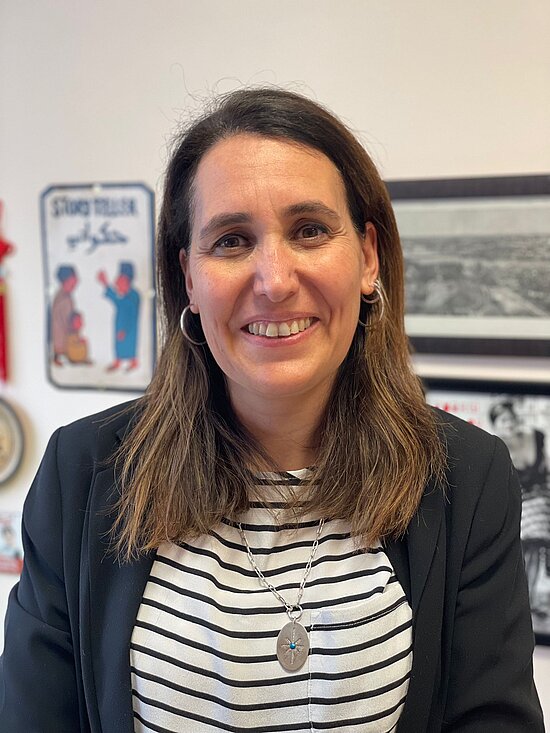Prof. Burcu Şimşek

Burcu Şimşek is an associate professor at Hacettepe University, Faculty of Communication, Department of Communication Sciences, Ankara, Turkey. She is the founder and the coordinator of the Digital Storytelling Workshop Unit in the Department of Communication Sciences. She completed her PhD with a thesis on digital storytelling and feminist activism at the Creative Industries Faculty, Queensland University of Technology, in Australia, in 2012 and has a MSc degree in Women’s Studies, Ankara
University. She started her career as a journalist in 1998. Since then, she has
been involved with storytelling and related practices for learning. She has facilitated over a hundred digital storytelling workshops in Turkey and abroad with various groups on diverse themes, from gender equality to migration and higher education, since 2009. She created and facilitated training on inclusion in diverse projects and programs of international organisations with storytelling pedagogies.
- Gender, inclusion and higher education
- Digital storytelling workshops and participatory art-based methodologies
- Gender responsive training programs and modules
CG9: Adult Education and Gender: Adult Education and Lifelong Learning policies for women
Co-Moderator: Prof. Natalia Alves
Over the past decades, there has been a significant growth in the number of non-traditional students attending higher education worldwide. Governments and higher education institutions encourage underrepresented students to enrol. Widening their participation is often directed at two main goals: enhancing the national economic competitiveness and the social inclusion within higher education for traditionally excluded groups such as the working classes, ethnic minorities, older students and the disabled. In this comparative group, we will focus on a particular group of non-traditional students: the mature women. The definition of mature undergraduates varies among countries according to age criteria. In some countries, they are defined as those aged 21 and over; in others, as 23 or 25 and over. In spite of these age differences, there is a common agreement among the academic community: mature students are those who are older than ‘traditional’ students (18 years old). The research conducted to explore mature women’s motivation for participation in higher education shows that entry into tertiary education was influenced in some cases by the state of their relationship with their families. In other cases, the desire to attend higher education has been present for a long time, but the implementation of this desire was delayed because of situational, institutional and dispositional barriers. Based on the analysis of interviews conducted by the participants of this CGW with mature women attending higher education institutions, we expect students:
- to compare mature women’s motivations to attend higher education;
- to compare the barriers they had to overcome;
- to compare the mechanisms of support they could count on.
-
Şengül İnce, Burcu Şimşek (2025) Old flavours in a new home: Migrant women's memories of food in Türkiye, Women's Studies International Forum, Volume 111, 103114, ISSN 0277-5395, https://doi.org/10.1016/j.wsif.2025.103114.
-
Liotino,M., Fedeli, M., Simsek, B. (2024) Il femminismo critico per re-immaginare una narrativa di genere nello sviluppo organizzativo Educational Reflective Practices-Open Access 1/2024, 29-47. https://doi.org/10.3280/erp1-2024oa18280
-
Şimşek, B., Karabağ, Ç., İnce, Ş. Sertalp, E. , Tözüm, T. (2024) “The Reception of Digital Stories in Dental Education: Triggering Thinking Skills for Empathy in Undergraduate Dentistry Students” Thinking Skills and Creativity, 51, p. 101475. https://doi.org/10.1016/j.tsc.2024.101475
-
Öntaş,E., Bahar-Özvarış,Ş., Şimşek,B. (2024) “Creating, publishing, and spreading processes of health-related contents in internet news sites: Evaluation of the opinions of actors in health communication” Frontiers in Public Health. Volume 12 - 2024 | https://doi.org/10.3389/fpubh.2024.1370343
-
Şimşek, B. (2018) Chapter 3: musical.ly and Microcelebrity Among Girls. Microcelebrity Around The Globe. Ed. Crystal Abidin, Megan Lindsay Brown. UK: Emerald.
-
Şimşek, B. (2017) Digital Storytelling for Women’s Well-being in Turkey, Digital Storytelling: Form and Content. Ed. Tricia Jenkins and Mark Dunford. UK: Palgrave Macmillan.
-
Şimşek, B. (2016) Neoliberal Burdens for Women in Academy: “How dare we not work” Kadın/Women 2000, Vol. XVII/1, June 2016, p. 51-71.
-
Şimşek, B. (2015) Introduction: Tomorrow’s Stories to be Left, in Broadening Digital Storytelling Horizons Special Issue- Guest Editor- Culture Science Journal, Vol. 8 No.2, pp.1-8


